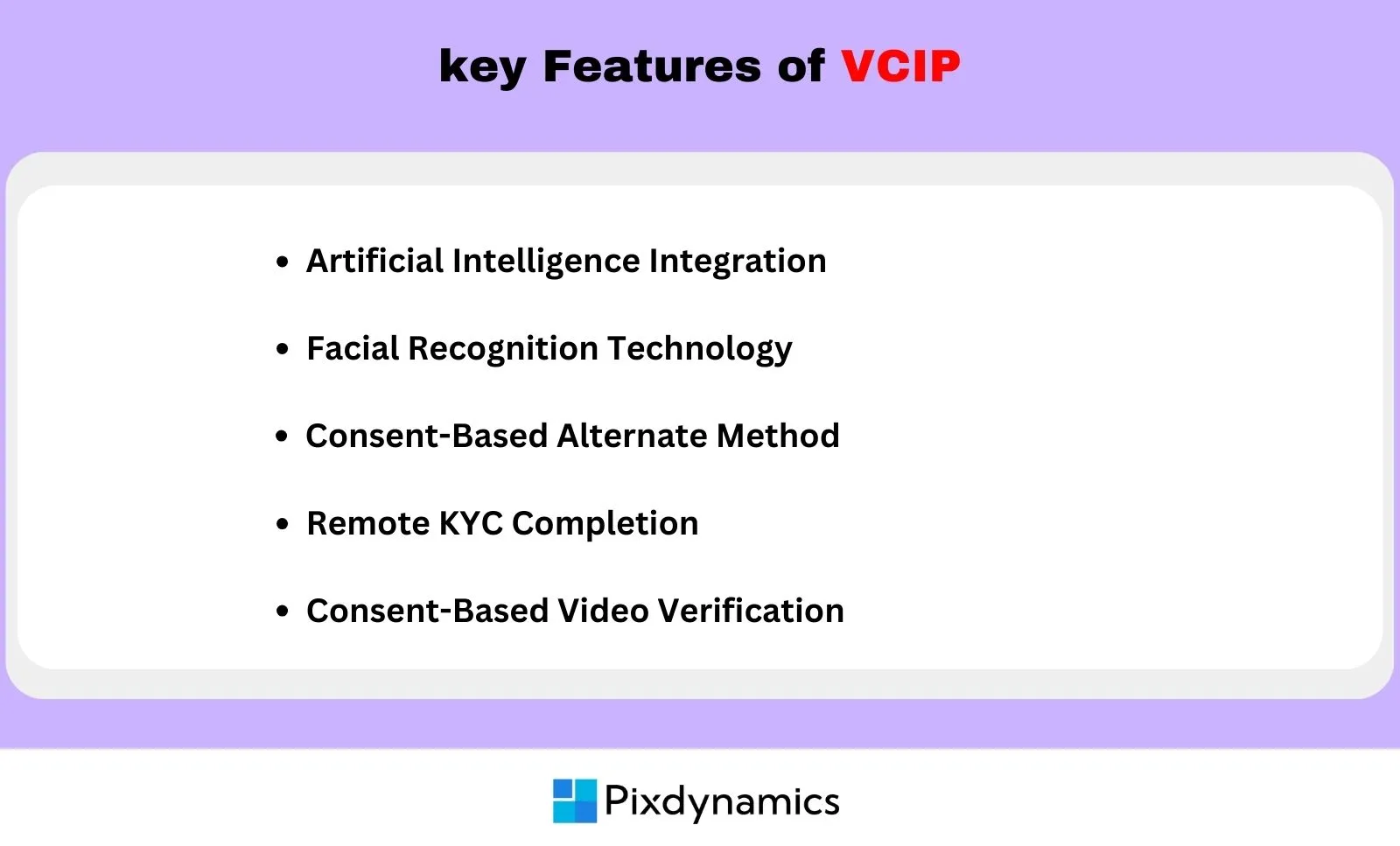Table of content
The Video-Based Customer Identification Process (VCIP) is a customer identification method wherein an authorized official from the regulated entity (RE) engages in facial recognition and customer due diligence (CDD) through video interaction with the customer. This secure, live, and informed-consent-based interaction gathers identification information for CDD purposes. Additionally, it verifies the customer-submitted information independently, all while maintaining a comprehensive audit trail of the entire process.
VCIP, introduced by the RBI, is a real-time, end-to-end encrypted customer identification and verification procedure based on video. This innovative process allows banks and regulated financial institutions to perform paperless KYC through a video call, guided by a trained official.

What is the Purpose of VCIP in Banking?
The purpose of Video-Based Customer Identification Process (VCIP) in banking is to streamline and enhance the customer onboarding process through secure and efficient means. VCIP allows banks and financial institutions to verify the identity of customers remotely, eliminating the need for physical presence.
The key objectives of VCIP in banking include
- Digital Onboarding : VCIP facilitates entirely online onboarding processes, aligning with the digital transformation trends in the banking sector.
- Efficiency : The process is designed to be quick, completing KYC within a few minutes, offering an instant way to open bank accounts.
- Regulatory Compliance VCIP adheres to regulatory guidelines, ensuring that customer identification is conducted securely and in compliance with the Reserve Bank of India's stipulations.
- Cost-EffectiveBy digitizing the identification process , V-CIP reduces the costs associated with traditional methods and paperwork.
Key Aspects of VCIP
- Customer Consent : The VCIP process begins with the customer's explicit consent to undergo video-based identification, ensuring compliance with privacy and regulatory requirements.
- Data Capture : An official captures a live video and photograph of the customer during the VCIP session, providing visual documentation for identity verification.
- Document Verification : In the case of RBI's VCIP, the customer's Aadhaar card is often used for verification, emphasizing the importance of validating official documents during the process.
- Amendments and Regulations : The VCIP process is subject to amendments and regulations, as seen in the RBI's efforts to cover various topics related to Video KYC, V-CIP, and KYC updation through regulatory changes.
- Digital KYC : VCIP is part of the broader landscape of digital KYC, which involves verifying Officially Valid Documents (OVDs) or Aadhaar through digital means, enhancing the efficiency of the customer identification process.
- Identity Verification Aspects : VCIP addresses various aspects of customer identity, contributing to a robust and secure verification process within the digital realm.
VCIP Process Step by Step
- Initiation with Consent : The VCIP process begins with the official initiating a live video interaction with the customer. The customer's explicit consent is obtained to ensure compliance and transparency.
- Data Capture : During the video interaction, a live video and photograph of the customer are captured. This step provides visual documentation for identity verification , enhancing the efficiency of the process.
- Aadhaar Verification : The customer's Aadhaar card is a key document used for verification. The information provided by the customer is cross-verified with the Aadhaar details to ensure accuracy and reliability in the identification process.
- Secure Live Interaction : The entire interaction is conducted securely, ensuring it is live and based on the informed consent of the customer. This live element enhances security and reduces the risk of fraudulent activities during the identification process.
- Paperless and Contactless : VCIP is designed to be a paperless and contactless process, aligning with the modern trend toward digital and seamless customer experiences. This reduces the time and effort required for customer onboarding.
- RBI Approval The VCIP procedure is approved by regulatory bodies such as the Reserve Bank of India (RBI). This regulatory endorsement ensures that the process adheres to the necessary standards and compliances, further bolstering the security of customer identification.

Traditional KYC vs VCIP KYC
Traditional KYC processes rely on physical document submission and in-person verification. This method involves customers providing documents like passports and utility bills, necessitating a visit to a physical location. The process is time-consuming, often causing delays in onboarding and transactions. Additionally, traditional KYC may pose security risks due to the handling of physical documents.
In contrast, Video-based Customer Identification Process (VCIP) KYC represents a paradigm shift by leveraging technology for remote verification. VCIP enables customers to undergo the identification process through video interactions, eliminating the need for physical presence. This approach not only enhances accessibility but also streamlines the verification process, making it more efficient and reducing the time required for onboarding. The Reserve Bank of India has officially recognized VCIP, emphasizing its role in promoting a seamless and secure customer experience.
VCIP (Video Customer Identification Process) is implemented as follows
The VCIP KYC process encompasses several key stages
- Determination of Customer's Risk Profile : Assessing and establishing the risk profile associated with the customer.
- Screening Against Sanctions and Negative Lists : Conducting checks to ensure the customer is not listed on sanction or negative lists.
- Monitoring of Account Activity : Continuously overseeing the customer's account behavior for any unusual or suspicious activity.
- Ongoing Updating of KYC Information : Regularly updating and maintaining the customer's KYC information.
The VCIP, denoting the Verified Customer Identification Program, is an initiative introduced by the Virtual Currency Industry Partnership (VCIP). This program aims to ensure accurate identification and verification of individuals utilizing virtual currencies. To partake in VCIP, businesses must complete an online application. Upon approval, specific customer details such as name, address, date of birth, and government-issued ID number are submitted to VCIP for verification.
Once customer information is verified, businesses are assigned a unique VCIP ID number for each customer, which is mandatory for all subsequent virtual currency transactions.
Participation in VCIP is voluntary, but it enables businesses to demonstrate their commitment to Anti-Money Laundering (AML) and Know Your Customer (KYC) compliance, reinforcing trust with customers.

The RBI has set up some rules for V-CIP.
The Reserve Bank of India (RBI) has given specific rules for banks to follow when they use the Voluntary Customer Identification Programme (VCIP). The main goal of VCIP is to make sure that banks provide good customer service and are clear about their dealings with customers. Under VCIP, banks have to share certain basic information about their products and services with customers for free. Here are the guidelines from RBI:
- Banks must create a system to collect and keep customer information.
- The data collected should be accurate and kept up-to-date.
- Banks should give customers the collected information if they ask for it
- Banks must tell customers why they are collecting their information.
TV-CIP offers several advantages for businesses, including
- Efficient Customer Identity Verification : V-CIP KYC enables businesses to swiftly and easily confirm the identity of their customers, serving as a deterrent to fraud and safeguarding the business against financial risks.
- Compliance with Legal and Regulatory Requirements : V-CIP KYC aids businesses in meeting legal and regulatory obligations. By verifying customer identities, it ensures adherence to anti-money laundering (AML) and countering-the-financing-of- terrorism (CFT) regulations.
- Time and Cost Savings : V-CIP KYC can save both time and money for businesses. By verifying customer identities upfront, it helps circumvent the expensive and time-consuming process of manual checks at a later stage.
- Consistent Customer Experience : V-CIP KYC provides a uniform and seamless experience for customers. Electronic identity verification contributes to a smoother customer journey, enhancing overall satisfaction.
- Enhanced Customer Trust : The process of verifying identities through V-CIP KYC demonstrates a commitment to customer security and privacy. This, in turn, builds trust and loyalty, fostering repeat business and referrals.
Conclusion
V-CIP KYC introduces a fresh approach for businesses seeking swift and reliable customer identity verification. This secure method is well-suited for businesses requiring efficient identity confirmation. V-CIP KYC serves as an excellent safeguard for online users' identities and personal details. Banks, by verifying this information, play a crucial role in ensuring the safety and security of online activities. This article aims to offer insights into the V-CIP KYC process, emphasizing its significance in helping customers maintain online safety.